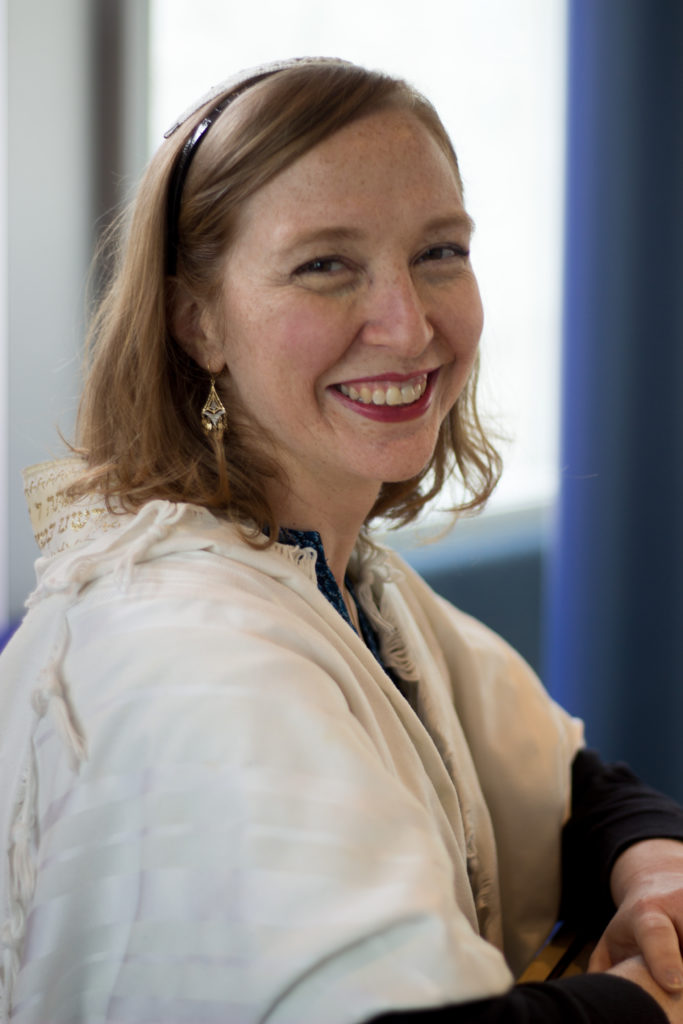We are in the blockbuster weeks of Torah portions describing the exodus from Egypt – the plagues, the escape, the Red Sea, the wilderness, the Ten Commandments at Mount Sinai. These days, given all that is happening in the world, one character jumps out to me among all these stories – that of Serach bat Asher. Briefly mentioned in Torah as one of Jacob’s descendants that goes down to Egypt (Genesis 46:17), she is also mentioned as being present after leaving Egypt (Numbers 26:46) hundreds of years later. Serach bat Asher is the timeless witness to the Jewish people’s story. She is said to have never died but to have been taken up to God, like Elijah the Prophet. She is closely connected to leaving Egypt – the midrash says that it was she alone who knew where Joseph’s bones were buried, and enabled Moses to keep the promise of bringing Joseph’s bones back to the Land of Israel.
Almost 20 years ago, I was at National Havurah Committee Summer Institute. Sitting in a music hall at a small college in New Hampshire, I listened while the artist-in-residence shared a new piano and voice composition. She explained to us the Biblical moment in Genesis 45:26 when Joseph’s brothers return from Egypt and must tell Jacob, who has spent the last seventeen years mourning the death of his favorite son, that Joseph is actually alive. The brothers tell him, “Joseph is still alive, and he is ruling over all of the land of Egypt.”
And then the artist-in-residence told us a midrash that I still think about to this day. In Midrash HaGadol, a 14th century Yemenite collection incorporating previous traditions, the story of that moment is this: The brothers ask little Serach bat Asher, Jacob’s granddaughter, to tell the news to Jacob, so that Jacob’s soul doesn’t fly out of his body in shock. Serach waits until Jacob is praying and sings him a gentle song:
“Joseph is in Egypt / There have been born on his knees / Menasheh and Ephraim”
Yosef be-mizrayim / Yuldu lo al birkayim / Menasheh ve-Ephrayim
He slowly begins to understand, and his heart stops. He is revived by seeing the wagons from Egypt and understanding that what Serach is saying is true. (See this wonderful essay by Rabbi Dr. Rachel Adelman for a more in-depth analysis of the stories of Serach bat Asher.)
Then, the artist-in-residence played us her setting on the piano, singing the Hebrew words above, their rhyming echoing in the music hall. Joseph is in Egypt. And he has two sons. Joseph is in Egypt. And he has two sons. He is alive and has a family even. I can still sing the tune today that she wrote, twenty years later, even though I don’t remember her name.
The image in the midrash broke my heart. This elderly man, Jacob, finding out all these years later that his son is in fact alive.
I never thought the midrash could break my heart even more, but now it feels that the story has a real-life context that is too real.
In emotional discussions at day school events and whispered conversations after the kids have left our Shabbat table, I find myself and my close ones wondering: How do we do this? How can we absorb the news coming out of Israel without our souls leaving our bodies? How can we watch late at night on our phones, in the already dark kitchen, the images of emaciated hostages being made to make excruciating speeches in front of hostile gun-toting Hamas crowds, without our hearts stopping? Where can I find wisdom about what to do when encountering such horror?
I want to suggest that perhaps this is a moment not to search for precedence or wisdom about how to deal with the content of this unimaginable time. Searching for similar times in our history adds more despair and less clarity. Perhaps this is the moment to search for wisdom on the process. The process of discovering your beloved is actually alive, against all odds, but is hungry and chained to the floor. Or that your beloved has been long dead and your daily hopes of being reunited have been for nothing. Or that he is recently dead, even so close to being freed. Or being a person reading about and hearing about these things. None of these can be prepared for, no matter how much our intergenerational trauma and wisdom might try.
But the process? The process Serach bat Asher taught us centuries ago. Break news like this slowly, gently, with love, lest the person’s soul fly out of their body. Let the person take it in note by note, bit by bit, until they can, maybe, try to face the full picture. And be gentle with ourselves, those of us who do not directly have a loved one suffering in the darkness. Take in the news slowly, just the amount that is possible right now. It is not weak to need to titrate the information. It is process wisdom brought to us by Serach bat Asher.

Rabbi Julia Appel is Clal’s Senior Director of Innovation, helping Jewish professionals and lay leaders revitalize their communities by serving their people better. She is passionate about creating Jewish community that meets the challenges of the 21st century – in which Jewish identity is a choice, not an obligation. Her writing has been featured in such publications as The Forward, The Globe and Mail, and The Canadian Jewish News, among others.

